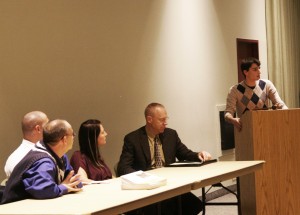
Drue Sokol, Photo Editor
A committee was assembled this fall with the aim of assessing and updating the language of the UR Student Code of Conduct and hopes to create a more cohesive, user-friendly and accurate document by the end of the current academic year, an initiative spurred by the vision of former Students’ Association President, SA Senator-at-Large and KEY Scholar Bradley Halpern.
Dean of the College Richard Feldman charged the committee, which has met three times so far this semester, with reviewing the Principles of Student Conduct, which appear on pages four to five of the Code of Conduct, because these principles have not been reviewed for several years, he said.
“Given the attention we’re giving to the Communal Principles, I thought that it was important to be sure that the Code effectively reflected our institutional values,” he said, adding that the principles will be assessed for their specificity, fairness and appropriate level of flexibility.
Thirteen principles of how students “might violate University standards and regulations” are enumerated across these two pages of the 28-page Code of Conduct, ranging from fraud, to drug and alcohol use, to theft, to hazing to sexual assault. The thirteenth principle states, in full, “Any violation of the University’s policies, rules or regulations.”
Feldman said he believed assessing the principles would be a sufficiently large task for the committee; review of the remainder of the Code or judicial processes fell outside a reasonable scope, he said.
Feldman did not ask for the review because he believes there are any “particular problems or deficiencies” with the current code, but rather because elements may need “updating,” he said.
“A fresh look may uncover things that are not as clear or accurate as we’d like,” he said.
Professor of Philosophy William FitzPatrick, who is chairing the committee comprised of faculty, staff and students, said he thinks the progress so far has been “very productive.” Most of the conversations have centered around deciding how to strike a balance between being detailed enough to provide helpful guidance to students and being general enough to cover the range of cases without giving the impression that if something is not explicitly stated it is not covered, he said.
FitzPatrick agreed with Feldman that there will likely not be any “major substantive revisions,” but rather just clarifications.
“The review wasn’t prompted by any general concern that the existing principles are terribly defective, but just by a desire to revisit the issues, have these conversations and update and clarify the principles to make them as effective and helpful as possible,” he said.
Halpern, who initiated discussion about the project at the end of his term as SA President last spring, said his goal is to ensure that the language is consistent and upholds University principles.
“My goal is to assess, not necessarily to change,” he said. “It might turn out that everything in it is fine, but the discussion is still useful.”
Halpern said that the committee’s focus on the principles rather than on the entirety of the document was a slight shift in focus from what he originally intended — evaluating the entire document.
In order to meet this goal, Halpern solicited the advice of former Dean and current Equal Opportunity Compliance Director Morgan Levy, who recommended that Halpern and a small group of students go through the entire document and then bring any issues they encountered to the committee, rather than the committee as an entity conducting a review of the entire Code — advice that Halpern has taken. As the group of students he has assembled conducts this review, Halpern said that he invites all students to contact him with input and suggestions.
Associate Justice of the All Campus Judicial Council (ACJC) and junior Matthew Lovell, who also sits on the committee, said that he thinks the best way to approach the review is “with an open mind.”
“It is important to see all perspectives and in order to do this I think a combination of committees along with working in small student groups is the best way to go,” he said, adding that in an ideal world the best strategy would be working with students first and then using the committee to devise the best solutions to issues found by students.
FitzPatrick said that he has invited members of the committee to highlight potentially problematic issues in the remainder of the document, such that these could inform the work of future committees. He said the current committee will likely present these issues when they present their findings about the principles to Feldman either at the end of this semester or the beginning of next.
Despite what he called the “change in focus of the committee,” Halpern remains determined to see that his original endeavor is completed before he graduates.
“I want to walk away this spring saying that the Code of Conduct is perfect and that every single word has been thoroughly evaluated,” Halpern said.
Lovell is optimistic that the work can be completed by the end of the academic year.
“It will definitely be a challenge as there still is a lot of work to do, however I am dedicated to seeing that it is done in a timely and thorough manner,” he said.
Buletti is a member of the class of 2013.




